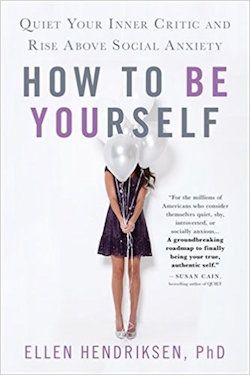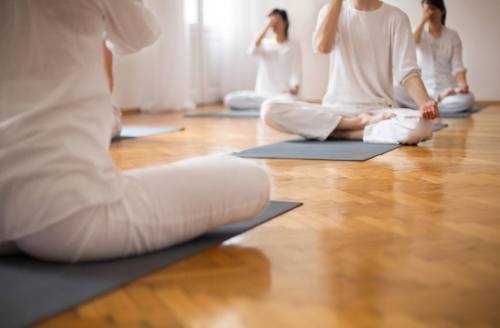Our editors independently select these products. Making a purchase through our links may earn Well+Good a commission
If you’re one of the roughly 40 percent of people with social anxiety, chances are you’re all too familiar with the unwelcome heart palpitations, sweaty palms, and uneasiness that surface whenever you want to come across as the confident cool-girl you know lives somewhere deep inside you. (Somewhere…)

“I call social anxiety the impossible-to-separate coffee-and-cream swirl of genetics and experience,” says clinical psychologist Ellen Hendriksen, PhD. In other words, it’s a nature and nurture phenomenon.
But while you might not be able to rewind time and redo your childhood, you can learn ways to overcome your social anxiety. Dr. Hendriksen’s new book, How To Be Yourself, is full of science-based tips to do so, and for a teaser, she’s revealing some helpful situation-based intel here.
But first, she offers a general piece of advice that can be applied whenever your anxiety rears its head: Focus on your surroundings. “When we’re in a socially anxious moment, usually our attention starts turning inward and we monitor ourselves, trying to figure out how we’re coming across,” she explains. (Cue annoying thoughts like, Does it look more natural if I put my hands in my pockets?) “To remedy this, we should turn our attention to what is happening outside [of ourselves], listening closely to what the other person is saying,” Dr. Hendriksen says.
So that’s step one. The next step likely depends on the particular scenario, because you’re going to need to act a lot differently on a first date than you would a meditation class.
Keep reading to find out how to overcome social anxiety in different nerve-wracking situations.

Giving a presentation
Leading a work meeting or giving a presentation can give butterflies even to people who don’t have social anxiety. “We often feel that with a presentation, it has to be super smooth and gold-star-worthy,” Dr. Hendriksen says. But she says that people actually respond better to presentations that aren’t so polished—they come across as more personal.
“Instead of self-evaluating yourself as you present—trying to figure out if you sound smart or are doing a good job—focus on your message and your passion for what you’re saying,” she advises. It’s a more specific example of her general advice on focusing outward, not inward, and it’s the trick to coming across as the confident leader you know you are.

On a date
“This is where perfectionism comes in, which is a huge driver of social anxiety,” Dr. Hendriksen says. She explains that, like giving a work presentation, dates can often feel like a performance. People put a lot of pressure on themselves to connect with someone right away and always have a witty response. Her advice here: Dare to be average.
“This is an instance where you want to lower the bar,” Dr. Hendriksen says. “Expect to have some awkward silences or not to be super smooth. Alarms aren’t going to go off around you if that happens, and keeping that in mind will help you to relax.” It will also free up your brain to figure out if the your date is someone you’re actually into, rather than focusing so much on yourself.

At a cocktail party or networking event
Is there anything a socially anxious person dreads more than a networking event? Going solo without your partner, work wife, or best friend can make it even worse. How do you know who to approach and what to say when you do? Just the idea is enough to make you break out in hives.
Dr. Hendriksen’s pro tip: Go in with a plan. According to one study, she says, when socially anxious people were given a task—getting to know as many people as they could in five minutes—they were actually just as socially competent as women who were overly extroverted. But when they were unknowingly evaluated on how good they were at small talk with strangers without given a task, they didn’t do so hot.
“You can tell yourself, ‘I’m going to talk to five people tonight,’ or ‘I’m going to get to know two people tonight,'” Dr. Hendriksen recommends. That way, you head into the situation with an agenda and a goal—not just a looming cloud of self-doubt.

At a workout class
There’s a reason why the back rows at fitness classes fill up before the front: Many people have an inclination to “hide,” having a “don’t look at me” mentality. Again, the trick is to focus outward. “Instead of comparing yourself to others in the class or wondering how you look, pay attention to the instructor, the music, and your body,” Dr. Hendriksen says.
And just remember, virtually everyone around you is so consumed with how they look in the floor-to-ceiling mirrors that they aren’t even looking at you anyway.

At a group meditation class
For some, a completely silent room is anything but Zen. If you have social anxiety, it’s normal to feel uber-aware in moments like these, afraid to cough, move, or draw any attention to yourself. How exactly does Dr. Hendriksen’s advice of not focusing inward work in a situation where the whole point is to self-reflect?
“Again, it comes down to focusing on the task at hand,” she says. “Thoughts about your rumbling stomach or if you’re doing it right are a distraction. Instead, focus on whatever it is you are supposed to be doing, whether it’s a body scan or focusing on a mantra.” Dr. Hendriksen points out that part of meditation is to bring yourself back from distraction over and over (and over) again. It’s something everyone struggles with—not just people with social anxiety. “That’s the whole practice!” she says.
Here’s how to know if you have anxiety or are stressed out—there’s a difference. And here’s how to use your anxiety so it’s actually beneficial.
Sign Up for Our Daily Newsletter
Get all the latest in wellness, trends, food, fitness, beauty, and more delivered right to your inbox.
Got it, you've been added to our email list.










